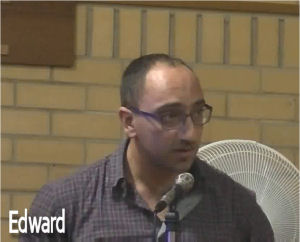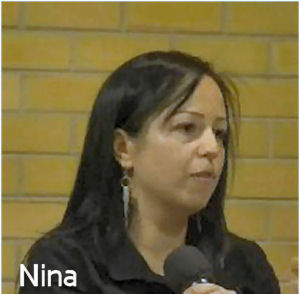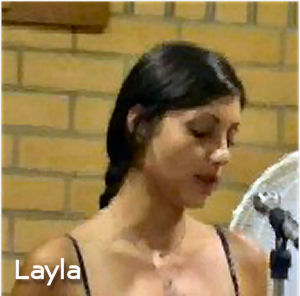Report and films of remarkable AMRIS Forum for Peace in Syria, Melbourne 6 March 2013
 This is the text of the introductory speech by Susan Dirgham to what turned out to be an uplifting evening on the politics of war in Syria, as interpreted by members of AMRIS (Australians for Mussalaha (Reconciliation) in Syria). The speakers formed a panel of two young women and one man, all with different connections to Syria and different perspectives. The level of political sophistication was very high, impressive, and stimulating. For those of you who were not able to attend the Unitarian Church on Wednesday 6 March, I filmed the event in four films. The films are embedded in this article and available at http://youtu.be/HifmWKE0cg4; http://youtu.be/exoNr8r4UEU; http://youtu.be/BpWjdzlOheg and http://youtu.be/obw4M40CeDM
This is the text of the introductory speech by Susan Dirgham to what turned out to be an uplifting evening on the politics of war in Syria, as interpreted by members of AMRIS (Australians for Mussalaha (Reconciliation) in Syria). The speakers formed a panel of two young women and one man, all with different connections to Syria and different perspectives. The level of political sophistication was very high, impressive, and stimulating. For those of you who were not able to attend the Unitarian Church on Wednesday 6 March, I filmed the event in four films. The films are embedded in this article and available at http://youtu.be/HifmWKE0cg4; http://youtu.be/exoNr8r4UEU; http://youtu.be/BpWjdzlOheg and http://youtu.be/obw4M40CeDM

AMRIS (Australians for Mussalaha (Reconciliation) in Syria).
Susan Dirgham: On behalf of AMRIS [Australians for Mussalaha (Reconciliation) in Syria] I’d like to thank the Unitarian Church, particularly the Social Justice Committee for hosting this evening.
What unites all the speakers you will hear tonight is a love for the people and secular societies of Syria and/or Lebanon.
That word ‘love’ isn’t sniggered at in Syria, as it might be in Australia. People use it frequently and it has meaning.
I don’t want to idealize Syrian society and the people, but in my mind, there is something in the air in Syria, or there was in the Syria I knew when I lived there and visited. It is very human, and very precious, and genuine.
The other main speakers at the forum were Edward, Nina and Leyla, pictured below. Each of his/her pictures is linked to the embedded video of his/her talk.
 |
 |
 |
I used to believe I could take something of value from our modern affluent world to Syria. Like a 21st Century missionary.
I took diaries with beautiful photos of Australian landscapes and I took koalas.
But I found so much in Damascus and other parts of Syria that was precious and that couldn’t be packed in a bag. It was both a physical and metaphysical expression of the history of humanity, something grand and sweeping, and tragic and triumphant, and still very much present - being lived by the people in Syria who have Arab, Turk, French, British, Palestinian, Russian, Roman, Greek, Circassian, Armenian, Kurd etc etc in their blood.
In the classrooms of the British Council, I felt that my Syrian students had a common purpose in bringing their society together, in modernizing it and uniting the disparate peoples, despite the enormous challenges and the threats from outside. It was hard work that the people of Syria were committed to, the women as much as the men.
In Syria, I was very conscious of the plight of the Palestinian people and of the war in Iraq. On television, we saw images of US soldiers walking the streets of Baghdad looking as alien there and as unwelcome as say Saudi Arabian soldiers would if they were striding the streets of Australia with AK47s.
But Syria was on the list of countries the neo-cons in the US planned to topple. Now the US and its allies are waging a modern day Cowboy and Indian fight in Syria, a 21st century digital crusade against Syria, with support from Britain, France, Saudi Arabia, Turkey, Qatar, Israel and Australia.
So it is a love for Syria and Lebanon which unites the speakers tonight. And it is Mother Agnes Mariam who has brought us together. Mother Agnes, as described by Angela Shanahan in The Australian (6 Oct 2011) was the mother superior of a 1500-year-old monastery in Syria.
For me, she is a modern day hero in a time when we imagine we don’t need heroes because our suburban life-style and city scape look so permanent. But trust me, we need heroes. The grand architecture and monuments or Syria appeared permanent to me; and the free and easy lifestyle which allowed young women to go out alone at night in Damascus did, too.
We need heroes. And we need to search hard for the truth, and demand that people in our media and the government do the same.
As in the 1930s, there are signs that a most terrible genocide could be committed in Syria and the region. It has to be prevented.

Recent comments